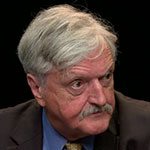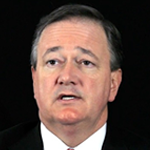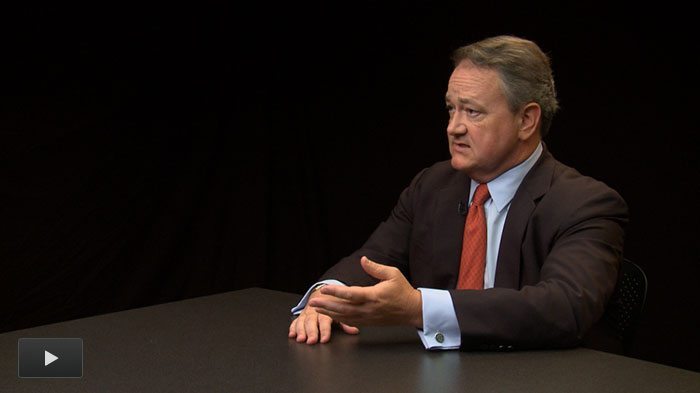The Fight Against Parkinson’s
Hear a boots-on-the-ground update on the battle against Parkinson’s Disease from the president of an organization that is backing the search for a cure. Robin Anthony Elliott is joined by PDF Chair Howard Morgan, also the co-president of private equity firm Castle Harlan.
Transcript Download Transcript
The Fight Against Parkinson’s
A Privcap Conversation with Robin Anthony Elliott and Howard Morgan of Parkinson’s Disease Foundation
David Snow, Privcap:
We’re joined today by Robin Anthony Elliott, the president of Parkinson’s Disease Foundation; and Howard Morgan of Castle Harlan and also now the chair of the PDF. Welcome to Privcap today.
Both of you are on the front lines of the battle against Parkinson’s disease. It’s an insidious disease and so I’m fascinated to hear about where we are. First, a question for Robin. Are there any signs of hope that we may be nearer to a cure for, or at least making great progress against Parkinson’s disease?
Robin Anthony Elliott, Parkinson’s Disease Foundation:
There are many signs. Unfortunately, right now they tend to be at the backend of the process, not the delivery end of the process. Looking back at Parkinson’s in the past 20 years, there was a period of huge hope during the 90s when there were more than a dozen new medications coming through. And it was felt that this is one disease in the central nervous system area that actually would lead the pack and that was true at that time. It was way ahead, for example, of Alzheimer’s about which we knew very little.
The last ten years have been largely disappointments at the business end of the pipeline. There has been something like 18 medications that have been studied into the later stages of the research process. Only two of them got through and neither of them were blockbusters. And so you’ve been facing an era of disappointment in the business side. The good part is that since tomorrow’s medications and breakthroughs are based upon today and yesterday’s science. The basic science of the past few years, which is where Parkinson’s Disease Foundation is centrally occupied, has really been very vigorous and quite productive.
On the environmental side, the second great driver of disease, we know of two major compounds largely in the agricultural, fertilizer area – rotenone, paraquat – which are implicated in Parkinson’s. That teaches us, in turn, about some of the ways in which disease can develop from that source. We know less about the environment. It’s much more expensive to study, much more complicated to study, but we’re getting more involved in that too. So I think if tomorrow’s medications depend upon today’s discoveries, which are quite promising but way, way short, unfortunately, of where we thought we would be just a decade ago.
Snow: If you both feel optimistic about what the next decade may bring, I’d like to ask a question about how the PDF will be involved in, hopefully, some breakthroughs. What is unique about the approach that the PDF has to backing research and to backing progress against this disease?
Howard Morgan, Castle Harlan & Parkinson’s Disease Foundation:
There are a number of groups that support Parkinson’s disease. We have been around since the 1950s, celebrating over 50 years in pursuit of a cure, as Robin sometimes says, “Put ourselves out of business” by making Parkinson’s go away. I think our core focus is basic research, the fundamental building blocks of science, which can be very arcane, but ultimately will be steps that lead to a cure; being stable, providing, finding the best scientists with the best grant proposals and then backing them on a stable basis for multiple years. I’ve been intrigued by how what a great scientist or great minds often set out to discover can twist and turn on the pathway to a real breakthrough. If you pull away the funding too soon you may miss a lot of opportunities.
Snow: Both of you are in touch with many people whose families are affected by Parkinson’s and with the overlap between that condition and the research that’s taking place, hopefully you can make a difference. Can you share any anecdotes of any conversations that you’ve had recently or situations you’ve been in that, to you, is illustrative of where we are today in the fight against this disease?
Morgan: In the roughly ten years that I’ve been involved with the organization, the comfort level coming forward with Parkinson’s disease has increased dramatically. And part of the education and advocacy that Parkinson’s Disease Foundation does, is to inform patients that part of the solution will be volunteering for clinical trials. One of the things we supported was a matching and an education of what clinical trials are out there and available. I think the willingness of individuals to come forward, acknowledge that they are ill, and participate on the border as volunteers or on a grassroots basis [is important.] We have added several board members in the last years that have the disease and it’s quite energizing to be working on the frontlines with somebody who we’re trying to save.
Elliott: About ten years ago, there was a board member of ours who was living in the Gulf Coast of Florida with his wife and he was walking in the street and he was stumbling, something that happens often in five to seven years after Parkinson’s is diagnosed. I’m not sure he was arrested. He certainly was stopped, questioned, he was in the paper, and this was a man with Parkinson’s. And no one at the police department or in the newspaper seemed to know that there were other questions to be asked. They just assumed there was alcohol involved or drugs or something else. That could not happen today or it’s extremely unlikely to. The succession of Muhammad Ali, Janet Reno, Michael J. Fox, people of real statute and consequence in the media has really changed the whole perception. I don’t want to say it’s a good thing, nothing is a good thing when it comes to disease, but it’s been extremely helpful that this currency of the disease and recognition of it means that we can then act on an open stage with none of the misgivings or embarrassment that used to attend it.
We have created a program which we call Research Advocates which takes people, volunteers who have Parkinson’s, prepares them through a very elaborate three day institute and then puts them into the national discussion about how we can advance Parkinson’s research. We call them Research Advocates. They become advisors to the FDA. We have two of them doing this. They become advisors to clinical trials. They become speakers to support groups. They do all kinds of things. But these are people who are truly outed in a very, very constructive way and take their experience and then help others understand, help researchers be informed, and help drive the science forward. These days, the people with Parkinson’s are playing a role in the disease study process, the research, that they never did in previous years and we think it’s a very important step forward in how we approach our work.


